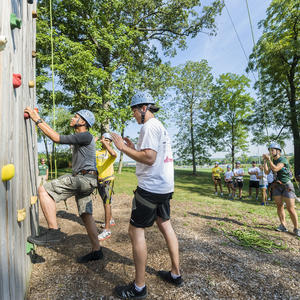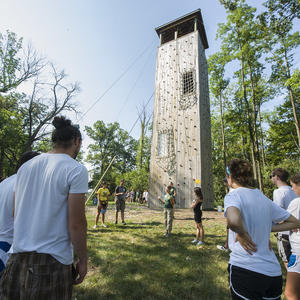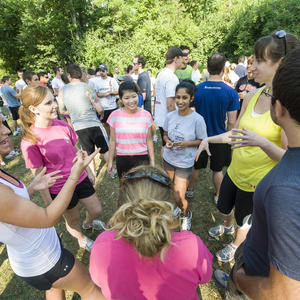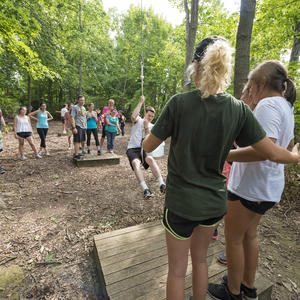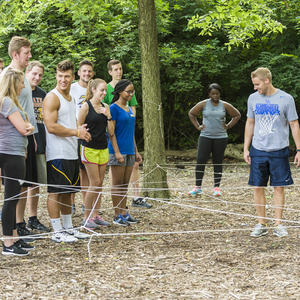Challenge Course

On this page:
- About the Challenge Course
- Available To
- Schedule a Program
- What to Wear
- What to Bring
- Challenge Course Liability Release
- Pricing
- Purpose and Goals
About the Challenge Course
The Wright State Challenge Course is located on Achilles Hill, adjacent to the baseball and softball diamonds behind the Nutter Center. Operation of the Tower is through the Outdoor Resource Center, Department of Campus Recreation. The Challenge Course currently consists of two components, the Climbing and Rappelling Tower and the Low Ropes Course. These programs can be combined or utilized separately to meet your group's goals.
Challenge Course Programs are great for:
- Student organizations
- Leadership development
- Greek organizations
- Wright State instructors who will be having students work together throughout the semester
- Wright State professional organizations
- Sports teams
- Special events and conferences
- New student and employee activities
- Newly formed groups and pre-existing groups
Climbing and Rappelling Tower
The Wright State Climbing and Rappel Tower is a four-sided self-contained tower stretching over 51 feet towards the sky. Each side is unique, offering diverse challenges for both climbing and rappelling. Side one offers a climbing experience utilizing artificial rock hand holds while the second climbing face offers cargo netting in addition to the artificial rock handholds. One rappel side has a 25ft incline board for beginners while the second rappel side offers over 50ft of sheer adrenaline.
The Tower provides an opportunity for individuals to try something new, grow through problem-solving, self-awareness and stretch one's personal comfort zone. It is an opportunity for the group to become anchored through a shared experience and learn to support each other and each member's individual goals.
Photo Gallery
Low Ropes Course
The Wright State Low Ropes Course contains 12 elements built specifically to help explore the inner dynamics of your group. The elements are diverse and vary greatly in the degree of physical and mental involvement required for a group to succeed. This allows the facilitators to sequence the elements to fit the specific needs and wants of your group. Many of the low ropes elements are designed to get participants a few feet off the ground, creating an atmosphere of elevated perceived risk, which fosters an environment for groups to focus on communication and trust.
Relationships are built and expanded on the course through strategic planning and problem-solving. Learning takes place through open communication and allows group members to form greater self-awareness about their own role within the group, and also the individual strengths and weaknesses of their peers.
Photo Gallery
Available To
The Challenge Course was built to serve the purposes of the university and the Army ROTC first, and then the needs of the community at large. For that reason, programs for the Wright State community are offered at a reduced cost.
Schedule a Program
Please request programs at least two weeks in advance.
For additional questions, please contact:
937-775-5019
outdoor@wright.edu
What to Wear
- Footwear: Close-toed shoes! Athletic style shoes are best. No sandals.
- Pants/Shorts: Pants should be comfortably loose to allow for movement. Shorts should be of modest length.
- Shirts/jackets: Wear what is comfortable, layering is recommended for cooler temperatures.
- Jewelry: No dangling earrings or hoops. Watches, necklaces, and rings are best left at home.
- Face covering/mask: Our Low Ropes Course requires close contact, so masks must be worn.
What to Bring
You should bring a water bottle and, depending on the length of the program, a small snack. Check with your group coordinator to find out if food will be provided during your time at the Challenge Course. In cool weather consider bringing an additional top layer of clothing and a warm hat and gloves.
Challenge Course Liability Release
All participants are required to fill out a Statement of Information and Release of Liability form (PDF) prior to engaging in any challenge course activities. It is important that you thoroughly read and understand this document before signing it.
Pricing
| Group Size | Level 1: WSU Student Organizations | Level 2: University Groups & Non-Profit/Government | Level 3: Corporate & Other Organizations |
|---|---|---|---|
| 6-15 | $45/hour | $90/hour | $135/hour |
| 16-30 | $90/hour | $180/hour | $270/hour |
| 31-45 | $135/hour | $270/hour | $405/hour |
| Group Size | Level 1: WSU Student Organizations | Level 2: University Groups & Non-Profit/Government | Level 3: Corporate & Other Organizations |
|---|---|---|---|
| 6-15 | $30/hour | $60/hour | $90/hour |
| 16-30 | $60/hour | $120/hour | $180/hour |
| 31-45 | $90/hour | $180/hour | $270/hour |
| Group Size | Level 1: WSU Student Organizations | Level 2: University Groups & Non-Profit/Government | Level 3: Corporate & Other Organizations |
|---|---|---|---|
| 6-15 | $15/hour | $30/hour | $45/hour |
| 16-30 | $30/hour | $60/hour | $90/hour |
| 31-45 | $45/hour | $90/hour | $135/hour |
*There is an additional travel charge for Team Building Workshops off of the Wright State Dayton Campus.
For details or questions regarding any of our pricing, or if your group is larger than 45, please contact Erin Sherrets at 937-775-5821
Challenge Course Purpose and Goals
Purpose
Campus Recreation is committed to providing exceptional facilities, programs, and services to create recreational opportunities that promote a healthier and happier Wright State family. The Challenge Course creates an environment that is supportive, productive, and enriching. It works to facilitate the development of personal and professional potential and outstanding leadership skills. The Challenge Course promotes self-discovery, the development of social skills, mutual respect, fair play, and sportsmanship while encouraging friendship and camaraderie. Positive relationships are built on laughter while celebrating successes and accomplishments.
Program Goals
The Challenge Course is designed to offer experiential learning opportunities for groups and individuals through games, initiatives, and the Tower and Low Ropes elements. By working through challenges on the course, success or failure can be transferred to real-life experiences at school, work, home and with friends.
- Individual development
- Improve self-awareness
- Build confidence
- Creative thinking
- Communication skills
- Stretch personal comfort zone
- Build trust
- Try new things
- Group development
- Build relationships
- Conflict resolution
- Leadership skills
- Problem-solving
- Cooperation
